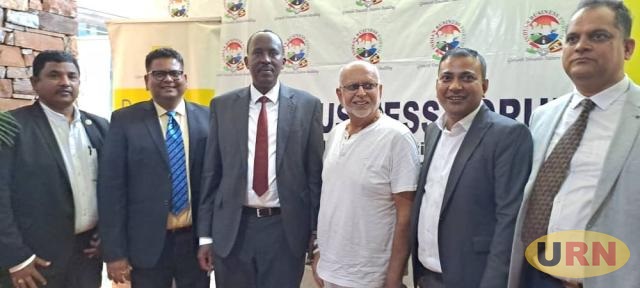
Kampala, Uganda | THE INDEPENDENT | The Uganda Revenue Authority (URA) is set to enlist all vatable smaller and medium size businesses on the Electronic Fiscal Receipt and Invoice Systems (EFRIS), to ensure efficiency in the collection of Value Added Tax (VAT), from these establishments.
This revelation was made by the URA commissioner general John Musinguzi after a meeting with the Indian Business Forum members which was called to discuss taxation, and other business facilitating mechanisms.
Alongside URA, the Ministry of Finance, and Uganda National Bureau of Standards were represented in the meeting on Friday.
According to Musinguzi, the Indian Business forum members raised several issues both operational and policy that needed to be addressed. One of the issue was the uneven deployment of EFRIS across all vatable businesses in the country.
To handle this, the commissioner general pointed that with immediate effect, all vatable business are to be enlisted to the EFRIS using either a desktop or computer application for those who do not have payment systems like those of bigger businesses.
The even deployment of EFRIS, across all businesses is seen as an opportunity to level the business ground, Musinguzi says the delay was due to the sensitization process, as well as developing the application which the smaller businesses are going to use.
Launched in 2021, and deployed in large businesses especially supermarkets and factories across the country, EFRIS is a digital tax collection measure that was established to block the VAT leakage at the point of sell.
This system tracks business transactions of vatable businesses, to determine the amount of VAT accrued by that particular business. The initiative, allows an interface between the businesses’ receipting system with that of URA, and for businesses with out systems, an application has been developed.
Musinguzi adds that the four hours closed door meeting, ironed out all the operational issues with immediate effect, and for the policy issues, it has been agreed that the two sides should jointly engage the Ministry of Finance and the Parliament, to make the required changes in policy.
“The other area were issues of multiple audits, on which we have agreed that moving forward, URA will have a shared compliance improvement plan which will be shared across all the departments, to reduce on the tax payer fatigue. What is not in our capacity to solve like the USD 350 charge per exports consignment to South Sudan, we have clarified that it’s not a URA charge and promised to request South Sudan to sensitize the traders about this new policy,” he says.
Rajesh Kumar, the director general of the Indian business forum said their main focus as a forum is to discuss with government and it’s agencies about the policies and challenges in business. He acknowledged the responsiveness of the URA management to the concerns of the forum members.
According to Kumar, the member had more than 15 complex concerns which needed attention, and the management of URA has effectively handled them with immediate solutions. He adds that this meeting has opened up direct communication with tax body and unlike before which lead to misguidance from some of their teams.
Sudhir Ruparelia, a renowned businessman, who is also a member of the forum and took part in the meeting, says the meeting has been very useful and has cleared the air about a number of issues, especially EFIRS which has been widely misunderstood.
******
URN
 The Independent Uganda: You get the Truth we Pay the Price
The Independent Uganda: You get the Truth we Pay the Price






Is this correct information? The corporate tax in Uganda is set at 30%. Personal income tax ranges from 5% to 10%, depending on your specific situation and income level. VAT in Uganda is 18%.